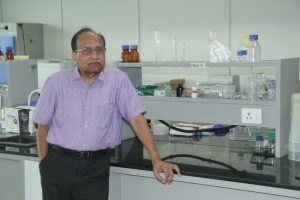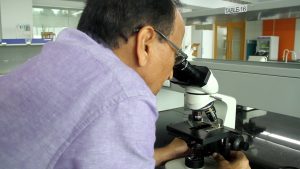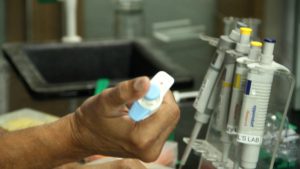 The fact that academics in the country are responsible for staggering amounts of research is well known. But it’s not very often that you come face to face with someone involved with life-saving medical research. Prof. C. Durga Rao has been a part of the team responsible for the development of Indian Rotavirus Vaccine. During his long stint with Indian Institute of Science, he worked on childhood viral diseases, primarily Rotavirus, and Enteroviruses, which are related to Polio Virus. Now he is setting up the laboratory at SRM University, AP to continue the vital work while helping students imbibe crucial research skills. What’s the progress? Read on.
The fact that academics in the country are responsible for staggering amounts of research is well known. But it’s not very often that you come face to face with someone involved with life-saving medical research. Prof. C. Durga Rao has been a part of the team responsible for the development of Indian Rotavirus Vaccine. During his long stint with Indian Institute of Science, he worked on childhood viral diseases, primarily Rotavirus, and Enteroviruses, which are related to Polio Virus. Now he is setting up the laboratory at SRM University, AP to continue the vital work while helping students imbibe crucial research skills. What’s the progress? Read on.
Bringing it home
As part of the team at the prestigious Indian Institute of Science, Prof. Rao played a crucial role in the development of the first indigenous viral vaccine developed and produced in India. He asserts that he joined SRM University, AP because it offered him an opportunity to continue with his research. “The administration is supportive and determined to develop the University as a research-oriented institution. I am sure that the coming years are going to be very significant for the R&D of the university. Though we are a new organization, the intellectuals gathered at the university are exceptional,” he says enthusiastically.
  |
Multidisciplinary model, multidisciplinary talent
Dr Rao’s enthusiasm, high energy are befitting of a researcher bursting with ideas, looking forward to making his University a significant contributor among worldwide R&D facilities. Given the multidisciplinary nature of studies and collaborations at SRM University-AP, he is also excited about working with researchers who are experts in fields like Nanotechnology, Gerontology and more. “But since we are working on the multidisciplinary and interdisciplinary models, mostly I have engineering students. So making Biology interesting to them is crucial,” he speaks of translating his passion onto his students.
Encouraging future researchers and thinkers
Dr Rao reveals that at SRM University, AP the focus is on the active participation of students. They are encouraged to ask questions and get marks for it towards their annual grading. The idea is to increase engagement that results in their all-round intellectual development. “In my biology class, we go from how life evolved to the latest advancements in the field. We also teach Data Analysis in Biology, which is an amalgamation of latest Data Analysis technologies with the standard practices of Biology. We want to keep things relatable and stimulating to help students apply their minds and be successful in careers they choose,” he spells out the long term goal.

